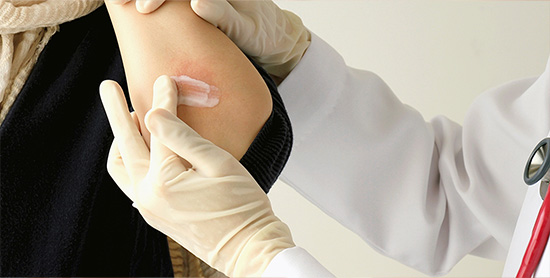Psoriasis Treatment
Treatment for psoriasis depends on the type, location and severity of the condition; as well as other medical conditions you may have, what other medications you are currently taking, and the impact that psoriasis has on your quality of life.


In mild cases of psoriasis (flaky, scaly and inflamed skin), various topical creams, ointments and scalp
solutions may be prescribed. These may include corticosteroids, synthetic Vitamin D, coal tar preparations
and more.
Ample moisturizing is key to reducing the dryness and itching; and any trauma or friction to the skin should
be minimized.
These are generally reserved for patients with more serious cases of psoriasis. They include:
In more severe cases that do not respond well to topical treatment, phototherapy (through the use of narrow band ultraviolet light B – UVB) may be considered. This is available in the clinic and performed 2 to 3 times a week.
Biologics are usually given via an injection.
In the case of psoriatic disease, the biologics used work by blocking the action of specific immune
cells that play a significant role in developing psoriasis and psoriatic arthritis.
As biologics are very targeted treatment, side effects are minimal and there is no need for regular laboratory monitoring.
At the Specialist Skin Clinic, we offer a range of biologics including Guselkumab, Secukinumab and
Risankizumab.
These medications are used to treat patients with moderate to severe psoriasis, especially for patients who have not responded well to topical treatments and/or phototherapy. Systemic treatments are medications whose effects work throughout the body. These medications slow down the multiplication rate of skin cells and reduce inflammation in psoriasis.
While results are satisfactory for most patients, this group of medications are not as targeted as biologic treatments and patients need regular laboratory monitoring because of potential side effects.
At Specialist Skin Clinic, the following oral medications are available:
- Methotrexate
- Cyclosporine
- Acitretin
You should seek specialist medical attention if:
- You notice signs and symptoms of a psoriasis flare-up
- Your symptoms are not improving, or even worsening, despite treatment
- The impact of the disease on your daily life is significant
- You wish to try out a more advanced form of treatment that a GP may not offer, such as phototherapy or biologic therapy

Joining Dr Cheong Wai Kwong are Dr Phay Ken-Lin and Dr Neoh Ching Yin, all of whom are particularly experienced in treating psoriasis, on top of all other medical and cosmetic dermatological conditions.

Main Line: (65) 6734 1411
Fax: (65) 6235 5900
Email: enquiry@specialistskin.com.sg
Mon - Fri: 8:30am - 5:00pm
Sat: 8:00am - 1:00pm
Closed on Sundays